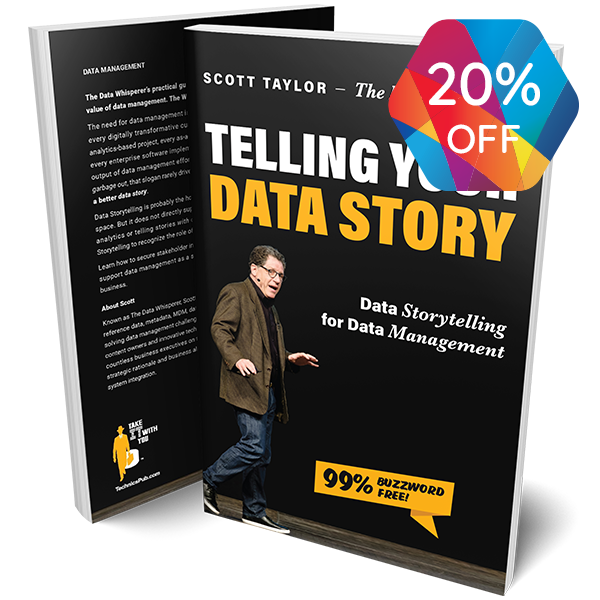Excerpt 1: Everything We Do Today Turns To Data
Everything we do today turns to data. As your business and business processes go from analog to digital, everything you do turns to data. Yet, enterprises of all sizes are struggling to make sense of it all. Instead of delivering incredible value, much of this data is creating a lot of chaos. Finding value in data is elusive and frustrating. How do you determine the truth and derive meaning from all that data to grow, improve, and protect your business?
What is your business case for data? I suggest it is the very business you are in. I assume your business purpose is to deliver value to your relationships through your brands at scale. Delivering value to relationships through brands has always been at the core of business. To do it at scale takes technology. Technology requires data. Data requires data management.
When you try to determine the truth and derive meaning from data, where do you begin? I begin with the simplest, most important data of all. It is the data about your relationships and your brands. Your relationships: customer, vendor, partner, prospect, supplier, citizen, patience, client, or consumer. How reliable is your data about those relationships? Duplicates? Confusing hierarchies? Missing classifications and segments? Conflicting geographies and markets? What about the data on your brands? Products, services, offerings, SKUs, banners, locations, materials, ingredients, and concepts? That might be a bit of a mess too.
Data management is one of the most important, and overlooked, competencies at most enterprises.
It is an unsung hero behind many business initiatives. Your company must fund and support data management as a systematic, consistent, fundamental part of your business. Not a project, but a program, Not a tactical exercise, but a strategic imperative.
If you are like most companies, you have multiple systems and workflows that support separate departments and divisions. Your relationship and brand data get created with differing definitions that lack internal standards.
You may already know how to fix your data, but your business leaders ignore your advice. Your business has no interest in your beautiful data “quality” dashboards. Your stakeholders don’t care about data “hygiene.” When presenting endlessly on your data maturity assessment, you start to sound adolescent. You fail to gain a commitment to support your data management efforts.
To better leverage the value of data management across an enterprise, the essentials must first be understood. When you explain it to the business, they are nodding “yes” on the outside and nodding off on the inside. To win your leaders over, you need to tell a better story.
The type of story you need to construct is a pitch. You are selling the idea of data management. Solving your selling problem, you need to work on what I refer to (with a knowing wink to Big Data) as The 3Vs of Data Management Storytelling – Vocabulary, Voice, and Vision. In most cases:
• The Vocabulary is confusing
• The Voice is discordant
• The Vision is blurred
When communicating to executive leadership, skip the technical details, the feature functionality, and the reference architecture and focus on:
• Establishing an accessible Vocabulary
• Harmonizing to a common Voice
• Illuminating the business Vision
If you are a data leader or practitioner, you are already well-versed in data management, data governance, master data, reference data, metadata, business glossaries, data dictionaries, data catalogs, taxonomies, ontologies, hierarchies, identifiers, classification schemas, and beyond. To spread your message, however, you need to make it simple.
You may already understand the programming and technical requirements. How to code, how to architect, how to implement these solutions. If you do, then you know more about that than I do. But what you may learn from me is how to explain the value of those things to your business stakeholders.
You probably need more funding to manage data because it doesn’t seem important enough to your board of directors. It is not the cool stuff. It is not the sexy stuff that everybody’s talking about. If you want funding, if you want support, if you want stakeholder engagement, you must be able to articulate the value of your proposition. That is true for every business proposition, but for Data Leaders, it can be particularly challenging.
Data and technology are rooted in hard skills: coding, stewardship, governance, architecture, and process design. Articulating the value and getting support often takes soft skills like storytelling. It is useful because it taps into what makes us all human. Data management storytelling is evangelism. You need to get people to believe in what you are saying, even if they can not see it. You need them to practice what you will preach.
Business stakeholders need an accessible way to understand the fundamentals of what makes data important - free of buzz words, technical descriptions, and hyped-up urgency.
_____________________
Excerpted with permission from Technics Publications from TELLING YOUR DATA STORY – Data Storytelling for Data Management by Scott Taylor, The Data Whisperer, of MetaMeta Consulting. The entire book is available at the links below.
- Buy from Technics Publications
- Buy from Amazon US
- Buy from Amazon UK




